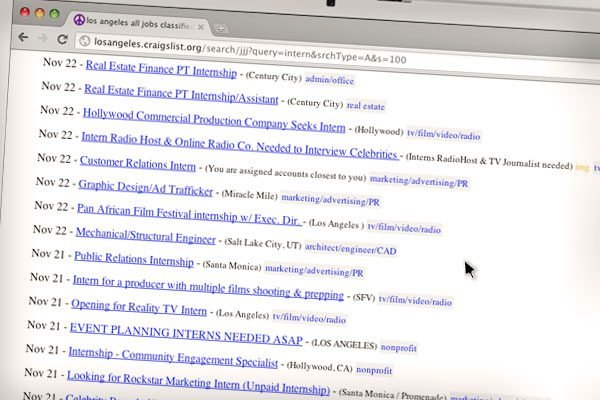Some people have direct deposit, some have the satisfaction of tearing the envelope on a physical check, and others get paid in cash under the table. But no matter if it comes bimonthly or weekly, payday is something to look forward to, especially if you’re living paycheck-to-paycheck.
But according to NPR, if you’re like half of America’s one million interns, you can’t live paycheck-to-paycheck because you’re not getting paid.
The legality of unpaid internships attracted media attention recently. NPR reports that two unpaid interns, Alex Footman and Eric Glatt, worked on the movie “Black Swan” and are now suing Fox Searchlight Pictures for the money they were not paid. As of press time, the case is ongoing.
It is clear that unpaid internships can go terribly wrong, such as in the above case. Yet if interns are careful, choosing an unpaid internship can still be a wise decision.
Internships are often unpaid when the organization or company cannot afford another position. Unpaid internships are good for people who are in school needing experience or who have other sources of income. Yet they become a problem when companies use interns for free labor.
“The Supreme Court ruled more than 50 years ago that only work done for training purposes could go unpaid. The Labor Department says companies began skirting the rule. Last year, it moved to issue a six-point test that for-profit internships must pass to comply with labor laws,” according to NPR.
According to the Labor Department test for unpaid internships, two of the points are that the intern “must receive training that’s similar to what an educational environment would offer . . . both the intern and the employer must agree the intern won’t be paid.”
Internship duties include responsibilities specific to the position and sometimes include daily tasks that no one else wants to do. But if interns agree to unpaid internships in order to gain experience, they should not complain unless the company or organization is violating its end of the deal–to provide experience. It doesn’t make complete sense to complain about something you agreed to in the first place unless your employer is using you unfairly so he or she can save money.
People may accept unpaid internships if they are trying to pave their way into industries that are difficult to “break into” or are unstable and apt to change, such as the film industry where Footman interned.
Yes, unpaid internships are risky and can have many disadvantages. Those who accept unpaid internships must weigh the benefits of experience against the discomfort of financial difficulty. An unpaid internship is worthwhile if the experience increases the intern’s chances of finding a paid position afterward, but it still involves a risk because jobs are not guaranteed. Extensive training does build a resume, but it may take a while to find a paying job afterward even for experienced interns.
Yet unpaid internships are worth it, especially in frequently changing fields, when they benefit both the employer and the intern–the intern gets good experience and the employer saves money by getting free labor. I have an unpaid internship that is perfect for me because it gives me valuable training, I have other jobs for sources of income, and I am still in school and cannot work full-time right now.
If you are still in school or are in need of experience and can afford not to get paid, an unpaid internship could be exactly the work you’re looking for. But when you are out of school and looking for a job to support yourself, don’t accept an unpaid internship unless there is a clearly defined benefit. Determine whether or not it is legal to do the kind of work your internship requires and not receive a salary.
Regardless of the career you’re looking for, you need to be prepared for the presence or lack of stability in your field and how that will affect your finances. Prayerfully consider the steps necessary to reach your career goals; this will help you decide if an unpaid internship will benefit you or waste your time.

 Replacing Mark Twain’s Words With Our Own
Replacing Mark Twain’s Words With Our Own Designer Babies: U.K. approves Embryonic altercation
Designer Babies: U.K. approves Embryonic altercation
Leave a Reply